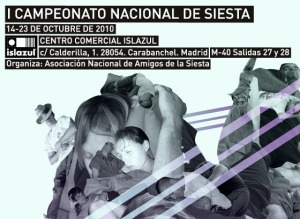If the international perception of the Spanish wasn’t already connected with the lethargy and decadence of the siesta, then it certainly is now after the country’s first national siesta championship last week. In what other country would you find 360 people, some clad in pyjamas with eye masks and teddy bears in tow, fighting it out to see who could snooze most impressively in a public place?
 The competition, organised by the National Association of Friends of the Siesta, challenged participants to sleep soundly in a busy shopping centre in Madrid while a doctor monitored their pulse for 20 minutes. Extra points were awarded to those who snored the loudest, slept in the most original position or wore the wackiest outfit. This contest was designed to prove that Spaniards can sleep anywhere, anytime. Well, that’s not the official line of course. Andres Lemes, the association’s spokesman, said: “The mission of the championship is to spread the idea that the nap is something of ours that must be defended and practised, because it is healthy and good for everyone”. The winner of the competition, Pedro Soria Lopez, won 1,000 euros after sleeping for 17 minutes. The unemployed security guard was dubbed ‘the Ecuadorean super-snorer’ after his snores registered 70 decibels.
The competition, organised by the National Association of Friends of the Siesta, challenged participants to sleep soundly in a busy shopping centre in Madrid while a doctor monitored their pulse for 20 minutes. Extra points were awarded to those who snored the loudest, slept in the most original position or wore the wackiest outfit. This contest was designed to prove that Spaniards can sleep anywhere, anytime. Well, that’s not the official line of course. Andres Lemes, the association’s spokesman, said: “The mission of the championship is to spread the idea that the nap is something of ours that must be defended and practised, because it is healthy and good for everyone”. The winner of the competition, Pedro Soria Lopez, won 1,000 euros after sleeping for 17 minutes. The unemployed security guard was dubbed ‘the Ecuadorean super-snorer’ after his snores registered 70 decibels.
It’s all light-hearted fun and in the eyes of the association this is a campaign to safeguard a national tradition, but the response of foreign observers may well be cynical. Oh those wacky Spaniards what are they up to now? Ever since Spain joined the EU in 1986 it has experienced pressure to ban the siesta as it hinders the EU goals of economic competition and international trade.
When it comes to stereotypes of the Spanish it is very easy to view them as a nation of nappers, from the tercera edad in Andalucia enjoying a slow pace of life, to the younger generation who party till six and sleep till four. Foreigners laughingly refer to Spaniards’ mañana attitude, relaxed in their Mediterranean lifestyle in a way that we could never replicate in the UK. The Spanish certainly enjoy their festivos, or bank holidays, which can be moved to ensure the public a day off work if they fall on a Sunday. Characteristic of this cheeky lethargy was a comment left by oldbrownhat on the Telegraph article where he or she claims to quote the Spanish proverb: Qué bueno es no hacer nada y luego descansar. (How beautiful it is to do nothing, and then rest afterwards.)
Furthermore, this competition is taking place at a time when the rate of Spanish unemployment is double the European average at 20%. Last month it was a very different scene as irritated workers manifested their opposition to austerity measures with a national strike. Surely there are more important things to protect than the siesta? Jobs, education and health for a start…
Hopefully those who have followed the siesta competition with interest will not buy into such simplistic Spanish stereotypes as outlined here. In reality, foreign office-workers who are tied to their desks without the right to a lunch hour let alone an afternoon nap would jump at the opportunity to copy the Spaniards’ example. And they might just get the chance. According to Alvaro Vidal of the National Association of Friends of the Siesta, the contest was such a success that it will be repeated in the future, and this time with extra editions outside of Spain. We might find a bit of that mañana philosophy rubbing off on us yet.
Photo: Campeonato de siesta
Video: itnnews

This is great stuff and should be sent to BBC “Have I got news for you” it would get some good laughs. More please.